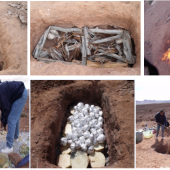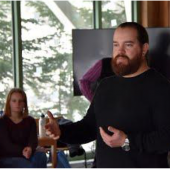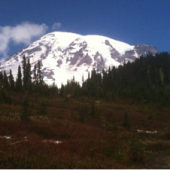
Abstract: For millennia, education for the Hualapai Tribal people was learned through intergenerational lessons taught with the family. This provided younger generations with the skills and knowledge needed to thrive in harsh desert environments. Over the past centuries tribal education has undergone numerous transitions. For the past twelve years the Hualapai Ethnobotany Youth Project has implemented an intergenerational learning program with the elders and youth of the tribal community to instill the centuries old knowledge that could only have been obtained through generations of experience. The program looks to new ways in modern times to teach the old ways in maintaining the continuity of knowledge that only the grandparents can remember.
Continue Reading
Ojibwe education is used at Conserve School, an environmental semester school, to help high school students better understand diverse perspectives on stewardship and to explore the history, cultures and place of the Northwoods of Wisconsin. In the Environmental Stewardship class, students learn about indigenous history, culture and environmental perspectives from a local Ojibwe forester. The students use this perspective to help them appreciate their place at Conserve School and explore their own environmental ethics. Students also participate in Ojibwe seasonal celebrations to better comprehend how place and people are interrelated.
Continue ReadingSince a curriculum represents a selection of socially constructed knowledge, it should be interpreted as a stake-holder in an ideological process. It is a political issue whose forms depend, among other things, on the degree to which education systems are centralized. Today, supranational bodies can influence the curriculum, particularly within the framework of UNESCO’s implementation of the decade of Education for Sustainable Development (ESD). Consequently, examining the curricula associated with the emergence of ESD involves examining the politics underlying them, politics which are not always explicitly stated – hence the interest in the concept of a hidden curriculum. The purpose of this study is to analyze the ESD curriculum in France. To this end, we use a methodology that considers the main work conducted about ESD in the framework of French research programs and based on the concept of hidden curriculum. This requires performing a diachronic analysis of changes in curriculum choices and forms of schooling, and identifying the value system underlying those changes. We identify several of the main characteristics of those changes, including in terms of project dynamics, partnership, transdisciplinarity, the role of knowledge, the distance from practice, and the persistence of a western conception of development. We then situate the French specificities within the international context.
Continue ReadingIn this issue of the Journal of Sustainability Education we explore regenerative agriculture, traveling from the inner city to the shores of Lake Superior. The research in this issue integrates both an ecological and social justice perspective and approaches the theme in a multitude of ways. Each writer actively explored the intersections between agriculture, land, […]
Continue Reading
Abstract: In this article, we discuss the importance of Indigenous traditional ecological knowledge as the foundation of sustainability education, and we describe the need for, and successful efforts to, begin building an Indigenous Traditional Ecological Knowledge initiative at a research university. We share the guiding theoretical framework of our work, and the three goals of the initiative. We note the tensions involved in crafting a vision statement that a diverse group of faculty, staff, and students can all uphold in our collective work. We conclude with a description of our next planned steps for the initiative, and our hopes that this work will help decolonize sustainability education.
Continue Reading